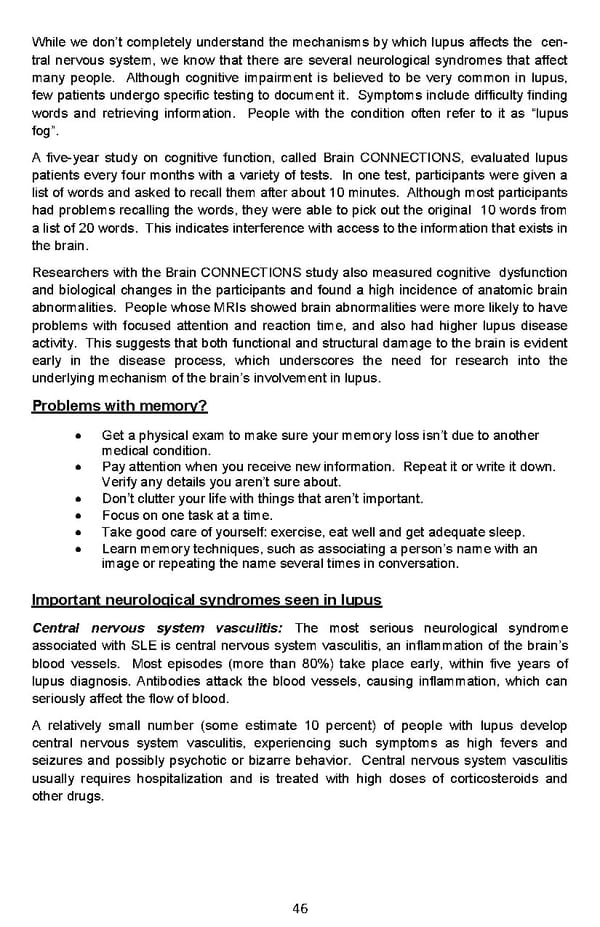While we don’t completely understand the mechanisms by which lupus affects the cen- tral nervous system, we know that there are several neurological syndromes that affect many people. Although cognitive impairment is believed to be very common in lupus, few patients undergo specific testing to document it. Symptoms include difficulty finding words and retrieving information. People with the condition often refer to it as “lupus fog”. A five-year study on cognitive function, called Brain CONNECTIONS, evaluated lupus patients every four months with a variety of tests. In one test, participants were given a list of words and asked to recall them after about 10 minutes. Although most participants had problems recalling the words, they were able to pick out the original 10 words from a list of 20 words. This indicates interference with access to the information that exists in the brain. Researchers with the Brain CONNECTIONS study also measured cognitive dysfunction and biological changes in the participants and found a high incidence of anatomic brain abnormalities. People whose MRIs showed brain abnormalities were more likely to have problems with focused attention and reaction time, and also had higher lupus disease activity. This suggests that both functional and structural damage to the brain is evident early in the disease process, which underscores the need for research into the underlying mechanism of the brain’s involvement in lupus. Problems with memory? • Get a physical exam to make sure your memory loss isn’t due to another medical condition. • Pay attention when you receive new information. Repeat it or write it down. Verify any details you aren’t sure about. • Don’t clutter your life with things that aren’t important. • Focus on one task at a time. • Take good care of yourself: exercise, eat well and get adequate sleep. • Learn memory techniques, such as associating a person’s name with an image or repeating the name several times in conversation. Important neurological syndromes seen in lupus Central nervous system vasculitis: The most serious neurological syndrome associated with SLE is central nervous system vasculitis, an inflammation of the brain’s blood vessels. Most episodes (more than 80%) take place early, within five years of lupus diagnosis. Antibodies attack the blood vessels, causing inflammation, which can seriously affect the flow of blood. A relatively small number (some estimate 10 percent) of people with lupus develop central nervous system vasculitis, experiencing such symptoms as high fevers and seizures and possibly psychotic or bizarre behavior. Central nervous system vasculitis usually requires hospitalization and is treated with high doses of corticosteroids and other drugs. 46
 Living Well With Lupus Facts Booklet Page 45 Page 47
Living Well With Lupus Facts Booklet Page 45 Page 47